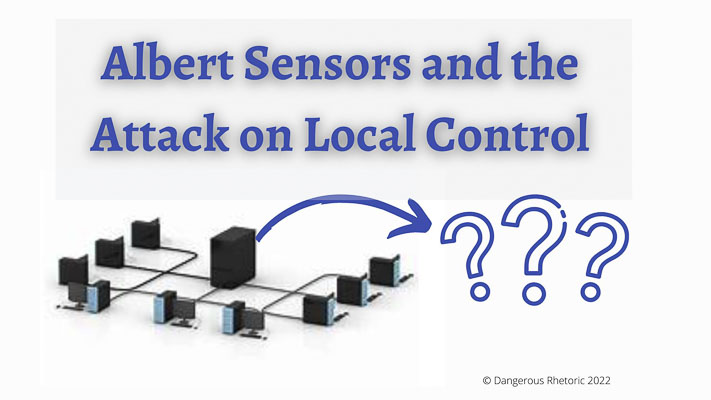
Nancy Churchill believes Democrats are working overtime to label anyone who has concerns about the integrity of election systems as ‘election deniers’
Nancy Churchill
Dangerous Rhetoric
Last week, National Public Radio launched a publicity campaign against the Ferry County commissioners. Their attack was focused on the commissioners’ decision to remove a device called an Albert sensor from our county’s computer network. On Aug. 28, NPR published a piece titled “Some Republicans in Washington state cast a wary eye on an election security device”. Then, on Sept. 2, NPR published an audio story titled “This Tool Was Supposed To Detect Election Hacking. Now It’s A Misinformation Target”.

When a national media outlet complains about “misinformation,” it is trying to suppress factual information that conflicts with the official Democratic party line. This important election year, Democrats are working overtime to label anyone who has concerns about the integrity of election systems as “election deniers.”
These two stories are structured to create a narrative that Commissioner Davis and the other Ferry County Commissioners are “election integrity deniers”. What’s the truth? Are the commissioners “election deniers” or sensible managers? Why is rural Ferry County, with a population of around 7,000 people, in the crosshairs of this national attack?
What’s an Albert sensor?
An Albert sensor is a device that was promoted nationwide as an added level of security to help detect ransomware attacks and alert local and state officials to any network intrusions. Albert sensors were installed in many Washington counties in the 2019-2020 time frame with great encouragement from the Washington secretary of state.
However, some counties refused the sensors, because there are significant restrictions written into the installation contracts. The Albert device monitors ALL county network traffic, not only election-related systems. In fact, county election processing devices are not even connected to the internet.
The Albert sensor contract also required the Center for Internet Security be provided 30 days notification before any system upgrades are implemented, limiting local network flexibility to make important upgrades. Finally, the county was not allowed access to an Albert dashboard to monitor the type of data collected by CIS. The Albert sensor is a true “black box system” – a node on the county network that the county cannot control and cannot monitor.
NPR’s articles ignore the facts to spin a narrative
According to a report from the Washington State Republican Party Election Integrity Committee, Grant County refused to install the Albert sensors at all, due to the contractual restrictions listed above. This report also detailed the problems that occurred in Lincoln County after the Albert sensor was installed. Lincoln County became the victim of a ransomware attack, but CIS never alerted the county to the ransomware hack from a known ransomware site.
Since the Albert sensor didn’t prevent the attack or alert the county about the attack, Lincoln County ended their contract and uninstalled the Albert sensors from its network.
NPR’s reporting implies Ferry County is leading a movement against the Albert sensor. It glosses over the fact the Ferry County commissioners only voted to remove Ferry County’s Albert sensor AFTER receiving the report outlining the concerns other counties had about the sensors. If the system isn’t working as advertised why continue using it?
Our commissioners also had prudent concerns about the restrictions on system upgrades, which would give a third party control over needed improvements on our county network. They also weren’t comfortable with a black box system having access to ALL data on our computer networks, rather than just election-related systems.
More questions
Why is the decision by several small, rural counties to remove these intrusive monitoring devices such a big deal? Do the Albert sensors do more than officials claim they do? Otherwise, why do the big national media attack their decisions?
In the NPR audio report, a former Department of Homeland Security official said the devices are “the best tool that the federal government has to see the entire landscape of what’s happening in cyberspace at these local election offices.” But the Albert sensor surveils the entire county network, and voting machines are not connected to that network. Why do the feds need access to ALL the data on our entire network? Why is Secretary of State Hobbs continuing to question the lawful decision making of county government?
Why Dox Ferry County?
If the SOS is worried about cyber attacks, why advertise on a national forum which Washington counties are the “most vulnerable” to such attacks? Will Washington Secretary of State Hobbs and NPR be liable for any costs incurred from future cyber attacks they cause in Ferry, Lincoln and Grant counties?
There’s also the “election security” issue raised in these reports. Ferry County Republicans observe and audit every election held in Ferry County, and we are confident that our county elections systems are both secure and accurate. We see no need to continue using an intrusive monitoring system which has unlimited access to our citizens’ private data.
I’m grateful our board of county commissioners is willing to stand up to the continued bullying tactics being used publicly and privately by the SOS and DHS. This attack on the local control of our computer networks is an attack on the privacy of every county resident and on the authority of the office of county commissioner.
Nancy Churchill is the state committeewoman for the Ferry County Republican Party. She may be reached at DangerousRhetoric@pm.me. The opinions expressed in Dangerous Rhetoric are her own.
Also read:
- Opinion: OIC tells consumers not to pay for ‘insurance’ you won’t likely benefit from: Does that include WA Cares?Elizabeth New (Hovde) of the Washington Policy Center believes you should consider yourself warned by the Office of the Insurance Commissioner about WA Cares and its maybe-only benefit.
- Opinion: Same road, different speed limit?Target Zero Manager Doug Dahl addresses a question about speed limit signs going into and leaving town.
- Opinion: Hiding the growing cost of the Interstate Bridge replacementJoe Cortright of the City Observatory addresses the rising cost of the Interstate 5 Bridge replacement project.
- Letter: ‘This election I am NOT voting for Greg Cheney’Clark County resident Wynn Grcich shares her thoughts on Rep. Greg Cheney and the issue of fluoridation in area drinking water.
- POLL: Should biological males who identify as females be allowed to compete in athletic events against biological females?Should biological males who identify as females be allowed to compete in athletic events against biological females?










